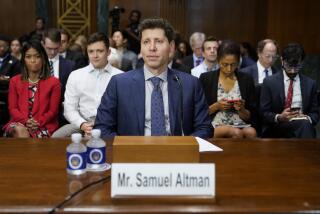Science Academy’s Study Heats Up Dispute Over High-Tech Exports to Soviet Bloc
- Share via
WASHINGTON — A National Academy of Sciences report criticizing the Reagan Administration’s attempts to control the transfer of U.S. technology to the Soviet bloc has intensified a long-simmering dispute between the Defense Department and high-technology industries, which were heavily represented on the panel that prepared the study.
The 500-page report, released formally last Wednesday, urges the United States to abandon most of its unilateral attempts to control the final destination of high-technology products sold to friendly nations.
The Defense Department vigorously opposes such a policy reversal, for fear that the American products might leak from U.S. allies to the Soviet bloc. But Congress, seeking to encourage U.S. exports of high-tech products, is moving ahead with legislation to strip the Defense Department of its authority to control exports.
The NAS report did little to build bridges between U.S. exporters and the Defense Department. Mitchel B. Wallerstein, project director for the NAS panel, charged that Stephen D. Bryen, head of the Pentagon’s Defense Technology Security Administration, “withdrew cooperation” from the panel after Bryen’s agency gave the panel a single briefing last February.
Wallerstein said that Bryen also “refused to disburse” half of a $200,000 appropriation to help finance the study. The funds had been approved by Richard D. DeLauer, the Pentagon’s former director of research and engineering, who had opposed the Administration’s hard-line policy on controlling all technology exports that might conceivably leak to the Soviets.
Bryen dismissed the NAS report as “inaccurate” in describing the Defense Department’s role in export controls, which by law and under a 1985 presidential directive are primarily the responsibility of the State and Commerce departments.
Under that directive, the Defense Department is authorized to intervene only when U.S. companies seek to export sensitive technology to one of 15 European or Asian countries thought to be lax in controlling leaks of technology to the Soviets. Disputes are to be worked out among the departments, with President Reagan breaking deadlocks.
Since 1985, Bryen said, “we’ve looked at about 20,000 cases of that sort. We report our findings to Commerce and, if there is a quarrel, we try to resolve it there. There haven’t been that many controversies. No case has had to go to the President.”
The NAS panel’s report is somewhat ambiguous on the way the Reagan Administration has implemented export controls.
On one hand, it credits the controls enforced early in the Administration with stemming an admitted flow of technology to the Soviets. It chides the Commerce and State departments for only sluggishly processing export license applications.
But the report also charges that “the Department of Defense has overstepped its legitimate statutory role . . . and has exercised de facto veto authority by delaying the review” of export license applications. As a result, it says, the Commerce and Defense departments “have been able to reach preliminary agreement on the decontrol of only three items.”
Bryen retorted that the government has decided 99% of all license applications within seven days. “There has been very little delay,” he said. “There have been cases that have been dropped because of the process but it’s hard to put a clock on that. I don’t recognize the record of the past two years in that report.”
Lew Allen Jr., chairman of the NAS panel and director of the Jet Propulsion Laboratory, praised the Defense Department on Wednesday for awakening the government early in the Reagan Administration to the dangers of technology transfers to the Soviet bloc.
“But it is inappropriate for Defense to dominate the process,” Allen said. “(Control of the issue) should shift back to Commerce as quickly as it can.” He recommended that the President order such a shift. “It’s better to do it in that form than have Congress legislate,” he said.
Rep. Don Bonker (D-Wash.) has already proposed legislation to ease export controls along the lines proposed by the NAS panel. His proposal was adopted by the House last year as part of the omnibus trade bill, which died in the Senate.
On Thursday, the Reagan Administration said it would lift an embargo on the sale of oil and gas equipment and technology to the Soviet Union. That embargo, however, was imposed in 1978 to protest human rights violations and was not related to defense concerns.
Among the 21 members of the NAS panel are several former Defense Department officials. But more than half the members are now affiliated with high-technology industries, which have sought authority to export with as little government hindrance as possible.
Panel members include Thomas A. Christiansen, manager for international trade at Hewlett-Packard; Herbert M. Dwight Jr., chairman of Spectra-Physics, a San Jose manufacturer of laser and optical equipment, and Ruth L. Greenstein, vice president and treasurer of Genex Corp., a Maryland manufacturer of biotechnology and genetics products.
More to Read
Sign up for Essential California
The most important California stories and recommendations in your inbox every morning.
You may occasionally receive promotional content from the Los Angeles Times.












